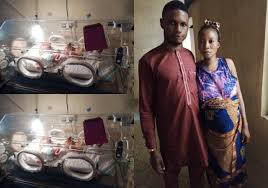Dauda Olamilekan, a 30-year-old butcher in Ogbomoso, Oyo State, has appealed to benefactors and governments at all levels for help in caring for his wife’s quadruplets.
This statement was made by Olamilekan in an interview with KURYALOADED published on Saturday.
The butcher’s wife, Rukayat Olamilekan, reportedly gave birth to quadruplets on Thursday, as reported by our correspondent.
There are two males and two girls among the quadruplets.
The Baaki Primary Healthcare Centre Ogbomoso is where the babies were born.
At the time this article was written, the infants were being cared for in the incubator at the Ladoke Akintola University of Technology (LAUTECH) Teaching Hospital in Ogbomoso.
Before the birth of the quadruplets, KURYALOADED learned, the family had already been blessed with two children.
But Olamilekan, the husband of the Alfa compound in Ijeru, near Ogbomoso, has appealed to benefactors and governments at all levels for help in providing for his family.
In an interview with KURYALOADED published on Saturday, Olamilekan pleaded on concerned Nigerians to come to his rescue.
He demanded that the government step in and help the family so that the infants would receive proper care.
On Thursday, my wife gave birth to quadruplets. In Ogbomoso, I have my own room. The term “butcher” describes me perfectly. My better half is seven years younger than me; we’re both 30. She works as a broker.
We are currently cashless. Because of our financial situation, I had previously urged her to terminate the pregnancies. After having a scan done at Genesis Medical Diagnostics Centre, we learned that there will be four children. Considering our financial situation, I advised that she have an abortion, but the center advised against it. Until she gave delivery, they assisted us.
We are currently cashless. I’m asking for help from higher-ups in government because we just can’t do it alone. I have no one to back us up. Ideally, governments would back us up.
“At LAUTECH’s Ogbomoso teaching hospital, the infants are currently being cared for in an incubator.”
